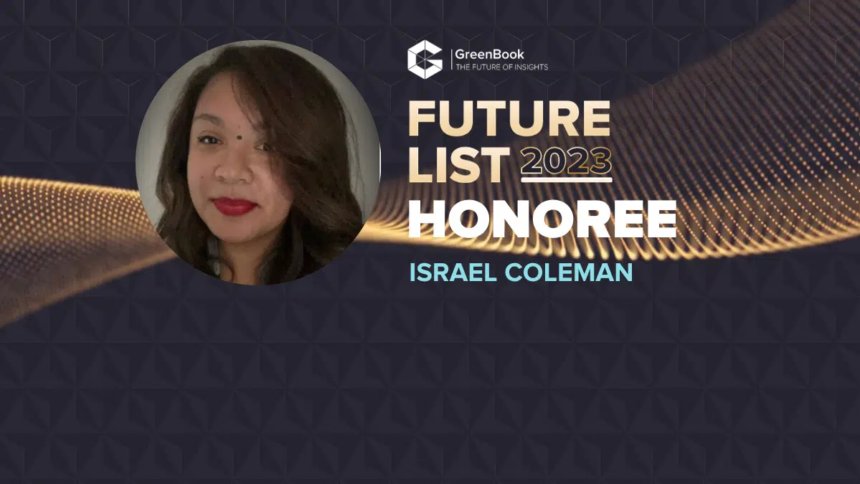Editor’s Note: The following interview features a GreenBook Future List honoree, Israel Coleman. The GreenBook Future List recognizes leadership, professional growth, personal integrity, passion, and excellence in the next generation of consumer insights and marketing professionals within the first 10 years of their careers.
Introducing Israel Coleman of GLG
Israel is the ultimate connector and always prioritizes mental health and wellness for her team and for the industry at large. She’s a fantastic icon for a more collaborative and supportive industry of the future. She’s a fierce advocate for others and working toward leadership roles where she can employ her expertise both in MR and in empathetic leadership.
By bringing a unique blend of passion, transparency, and empathy to overall research initiatives, researchers, clients, and participants Israel is able to make research tangible. Implementing a crucial balance of methods expertise and human-first practices is her priority. She feels deeply about the importance of investing in future leaders, innovators, and participants by providing them with nurturing advice and space to share their voices.
Since starting your career in MRX, what would you consider to be your greatest accomplishment?
I think one of my greatest accomplishments is that I am synonymous with tacos! Most everyone who knows me, client or colleagues, can probably tell you that about me. I think that is important because to me it brings a more human side to any business interaction. And at the heart of research is people and I think it’s an important to remember that. It allows those who work with me (in any capacity) get an opportunity to know me as a person and build rapport.
I also tell those I am leading and/or mentoring that at the end of the day, we’re all just people working together for a common goal so it is okay to show some of your personality and be yourself! Additionally, sharing something that you take delight in will not only help you build your personal brand but also give you confidence as you might find some commonalities with your peers. In a world with a lot of AI coming to the forefront, it is important to bring a human element back into the research industry.
When did you know you wanted to enter a career in insights, and what inspired you?
I think probably six months in my first MR job I realized how interesting MR was to me and that I wanted to pursue this industry long term. That is when I decided to actively pursue learning more about the “black box” that was a project. Eventually, transitioning into project management and understanding more about what drives client delight and how to marry that with internal team collaboration.
Being naturally curious about the ‘why’ in research I sought out a research role as delivering actionable and tangible insights is a passion of mine. Once I found the sweet spot of delivering end-to-end for clients and building strong relationships with internal counterparts I reflected on the ebbs and flows.
Tell us about any advocacy/volunteer/association work you’re doing within the industry.
WIRe (Women in Research), I will shout them out always, through my participation in WIRe I have met so many amazing and inspiring women who I am able to learn from and fellowship with! I am a part of the WIRe mentorship program this year as mentor and it has been such an honor to share my experience with others. I am also a part of the WIRe C-Track program which supports and promotes young female leaders in their career journeys with the potential and goals to one day be at the C-Level.
It is well documented that there is a disparity in pay and roles by gender and I think women leadership is important and representation matters. Organizations like WIRe connect people in the industry with this mentorship program that might not have otherwise met or been able to glean knowledge from to grow in their careers. There is a definite spirit of paying it forward which I absolutely support.
What challenges do you see facing newer MRX professionals as technology advances?
One the main challenges I see facing MRX professionals is finding the true human voices of respondents in data which might be skewed or overshadowed with artificial intelligence. With the exciting developments of tech like ChatGPT brings new challenges in data quality and how to control for it in online surveys.
Things like tone may be lost in the algorithms and make it more difficult for researchers to interpret the data collected. Weeding out AI generated responses from true human created opinions and sentiments may prove difficult and will be a problem that will need to be solved for as this technology and knowledge of how to use it becomes more widely available.








